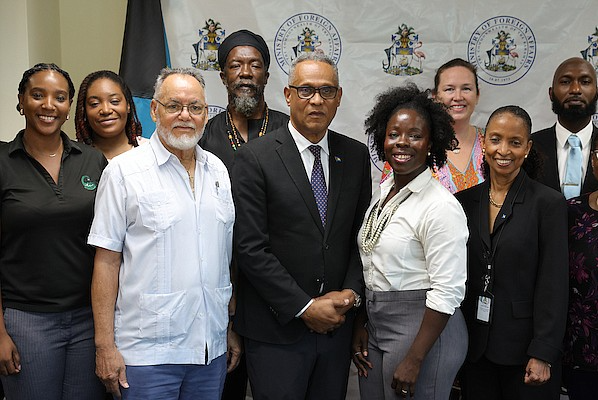Haiti joins CARICOM Reparations Commission
The following article is republished from Dominican Today and was written on August 12, 2024.

The Bahamas National Reparations Committee officially relaunched on Friday just days ahead of Emancipation Day and a decade after it was first formed.
Dr. Niambi Hall Campbell Dean, the committee chair, said the committee never stopped working at a press conference at the Ministry of Foreign Affairs yesterday.
She acknowledged there have been times when the committee’s activities were less known due to the lack of resources to raise awareness.
Acting Minister of Foreign Affairs Dr Michael Darville said the Bahamian government supports the work of the committee.
“The government of The Bahamas stands shoulder to shoulder with this distinguished committee and CARICOM Reparations Commission as they continue to engage our former colonial state on the historic, moral, and legal case for reparations concerning crimes against humanity, stemming from genocide and slavery brought on by the transatlantic slave trade and yes we cannot forget climate justice,” Dr Darville said.
The issue of reparations for native genocide and chattel slavery was brought to the forefront at the 34th CARICOM heads of government held in Trinidad and Tobago in 2013.
At that meeting, the establishment of National Reparations Committees and a regional CARICOM Reparations commission were agreed upon.
In March 2014, the cabinet of The Bahamas established The Bahamas National Reparations Committee led by Alfred Sears and Philip Smith and later Professor Chris Curry who served as Chair from 2017 to 2018.
The “Report on Reparations for Transatlantic Chattel Slavery in the Americas and the Caribbean” calculated that the United Kingdom would likely owe £18.8tn for its slavery involvement in 14 countries.
Dr Campbell Dean referenced this report when speaking about the sum owed in reparations; however, she explained the reparations movement in the Caribbean is a developmental reparations movement.
“So we have a 10-point plan in which reparations would help to assist in those areas of development, including things like public education, public health awareness, psychological rehabilitation. All of the things that were underdeveloped and destroyed through colonialism and slavery.”
Asked about the likelihood of getting reparations, she replied: “You know my response to that is, especially in the Emancipation weekend, is that could you imagine with an enslaved persons 200 years in the middle of slavery would have thought.”
She continued: “They could have never imagined having seen 100 years of slavery pass, and knowing or not knowing but hundreds of years of slavery to go there was no way for them to imagine freedom.”
“So while trillions of dollars may seem like an astronomical number Emancipation seemed like an astronomical event and yet we are here celebrating 190 years, and so we believe that reparations will come and it’s just a matter of time.”
While some argue Bahamians should not expect reparations, because the British gave aid in certain instances, Dr Campbell Dean made it clear that reparatory justice is not charity.
“Charity would be what you give after a natural disaster,” she said.
“We are appreciative of those charitable acts but reparations is really about justice and so it is the justice that is due for the crimes against the United Nations designated Crimes against Humanity of slavery and the genocide of the native peoples of this land.”
The chair said the reparations movement is growing by leaps and bounds. She even listed a few examples of reparations that have taken place through private entities.
Laura Trevelyan, a family member of a slave owner in Grenada, issued a formal apology and pledged £100,000. The Church of England apologized and aimed to raise £1 billion to address its historical links to the slave trade.
Dr Campbell Dean and other committee members are preparing to participate in a Regional Diaspora Conference in Brazil and the Pan African congress in Togo.
